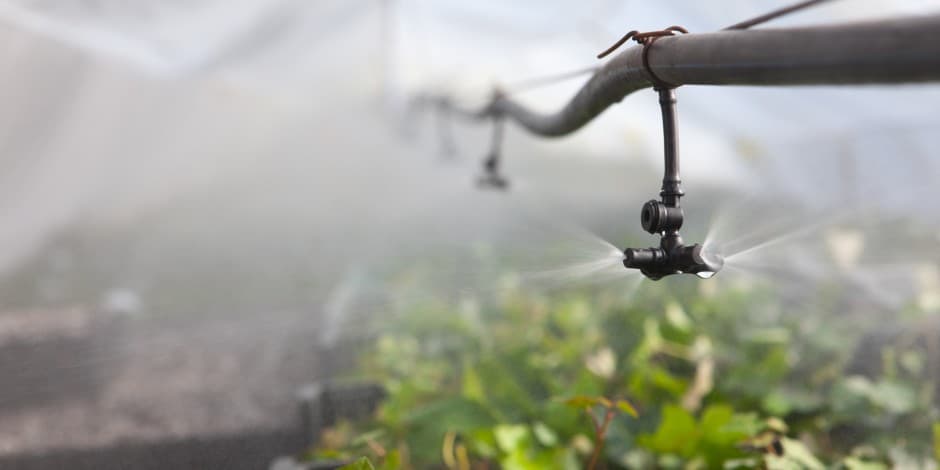6 Uses & Features for Compact Electric Agriculture Pumps

Shawn Glover, VP of Sales, May 23, 2023

The agriculture industry includes a wide range of activities, from growing and producing crops to raising livestock, and the pump industry plays a major role in achieving both.
Animal drinking systems and irrigation pumps are often top-of-mind. However, there are numerous smaller electric motor pumps used in agriculture beyond high-flow water pumps. Low-flow electric agriculture pumps help improve crop yields, milk production, food safety, and herd health, and provide a host of other benefits for the following applications.
- Fertigation and Chemigation
- Sanitation During Milking
- Evaporative Cooling
- Greenhouse Misting
- Pest Control
- Dust Suppression
RELATED: Pump Comparison Cheat Sheet
1. Fertigation and Chemigation
A compact chemical metering pump can be used to inject precise amounts of nitrogen, phosphorus, and other chemicals into a larger irrigation system. Smaller scale systems like drop irrigation can also use chemical metering, requiring greater precision. Fertigation — often used in orchards — is heavily regulated and requires precise application to properly address a soil’s pH level or other nutrient needs of vegetation.
VIEW FERTIGATION & CHEMIGATION PUMP RECOMMENDATIONS
2. Sanitation During Milking
As part of the milking process, dairy farmers have a strict cleaning protocol to minimize somatic cell counts (SCC), maintain herd health, and achieve higher milk prices. Chlorine dioxide is injected into a main water line of a teat washing station in a milking parlor and pumped to each animal. Precise percentages of these compounds must be maintained based on individual animal needs, and the simple turn of a knob on a variable speed flow controller helps adjust flow. A PVC body and ceramic plunger are recommended for chemical compatibility.
VIEW SANITATION PUMP RECOMMENDATIONS
3. Evaporative Cooling of Livestock and Workers
During the summer months, livestock can suffer from heat stress, reducing milk production in dairy herds and slowing weight gain in livestock. The use of evaporative cooling systems is an effective way to maintain cooler temperatures without using expensive air conditioning systems or chemicals. Evaporative misting systems are designed to ensure that surfaces remain dry.
VIEW EVAPORATIVE COOLING PUMP RECOMMENDATIONS
4. Greenhouse Misting
Many of the vegetable crops we consume begin their life cycle in a highly controlled greenhouse or aquaponic atmosphere. Ultra-fine misting sprayers help to increase harvests by controlling temperatures and humidity. Solar-powered pumps are sometimes used as a sustainable energy source for those who are more eco-conscious.
VIEW MISTING PUMP RECOMMENDATIONS
5. Pest Control
Flies, mosquitoes, and other pests can be a health hazard. Insecticide application using a fine mist or fog can quickly reduce populations. The most common active ingredients in pest control products labeled for horses and cattle are pyrethrins and pyrethroids and are safe for use on animals. Pest control pumps used for crops often require a broader spray application and may use other insecticides. Chemical compatibility is a major consideration when choosing a pump.
VIEW PEST CONTROL PUMP RECOMMENDATIONS
6. Dust Suppression
Dust suppression pumps dispense a fine mist to help control dust in barns, feedlots, and even horse arenas. The simple use of water helps ensure a safe, natural, and organic dust suppression method. An important factor in selecting any dust suppression pump is to ensure proper flow and pressure. Too little and it will be ineffective; too much and you create a slippery and messy sludge.
VIEW DUST SUPPRESSION PUMP RECOMMENDATIONS
Considerations for Electric Pumps for Agriculture
The environments in many agricultural applications can be extremely harsh, exposing equipment to dust, debris, vibration, heat, cold, and other abuses. As such, pump durability is paramount, making plunger pumps an ideal solution. Here are some features to look for in agriculture pumps:
Electric-powered
Eliminating the use of high-priced fuel and the inherent hazards that come with it — combustible materials, carbon monoxide fumes, noise levels, etc. — are major considerations, especially in close quarters. High-pressure electric pumps are safer, maintain quiet operation, and cost much less to run.
Sustainability
Sustainability is also a major concern among many operators. Some states have even begun passing regulations banning some gas-powered equipment, so converting to electric can help companies get ahead of the curve.
Chemical Compatibility
Chemicals used in agricultural applications can be highly corrosive to some pump materials and components like O-rings. Ceramic plungers are often recommended for use with chemicals, but alternatives may work depending on the compounds being sprayed. A reputable pump manufacturer will ensure chemical compatibility.
Consistent Flow Rate and Pressure
Achieving precise flow rates and pressure is the key to dispensing accurate amounts of chemicals or achieving the right type of spray pattern. Consistency and accuracy ensure that expensive chemicals aren't wasted and that safety is not compromised.
Compact Size
The tight quarters of many agricultural applications call for pumps that are compact and easily maneuvered. A smaller footprint is another major advantage of most electric pumps, but it’s critical to not sacrifice performance in return.
Which Pump is Best for Agriculture?
For the agricultural applications noted here, positive displacement pumps are ideal because they are more likely to dispense accurate amounts of chemicals and stand up to harsh conditions. These factors are especially important when a herd’s health or food safety are on the line.
Electric plunger pumps offered by Pumptec allow for the most precise flow and pressure while ensuring durable operation for years to come. See for yourself in our Electric vs. Gas High-Pressure Pumps Infographic below. Then, contact our pump experts to talk through your unique agricultural application and how our American-made pumps can provide the solution you’re looking for.



